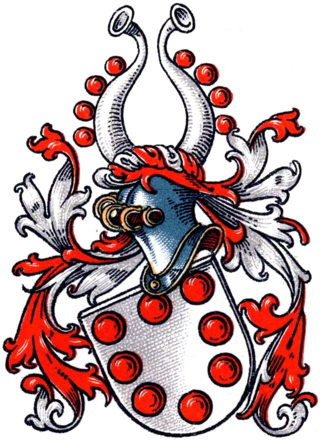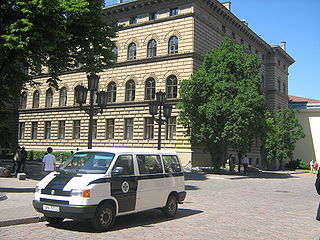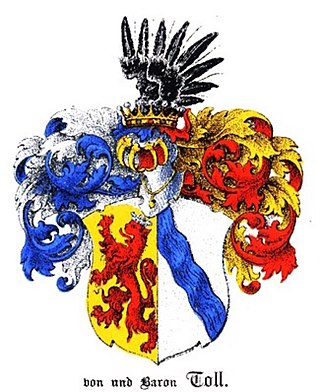See also
- Stackelberg competition (named after Heinrich Freiherr von Stackelberg), a strategic game in economics in which the leader firm moves first and then the follower firms move sequentially
Stackelberg is a surname, mainly known as the surname of a noble family of Baltic German descent (see Stackelberg family). Notable people with the surname include:

The Governorate of Estonia, also known as the Governorate of Esthonia was a governorate in the Baltic region, along with the Livonian and Courland Governorates. It is a part of the Imperial Russian administration (guberniya), which is located in modern-day northern Estonia and some islands in the West Estonian archipelago, including the islands of Hiiumaa and Vormsi. The Governorate was established in 1796 when Paul I's reform abolished the Viceroyalty (namestnik). Previously, the Reval Governorate existed under Peter I's reign from the Treaty of Nystad, which ceded territory from Sweden to the newly established Russian Empire, until its inexistence in 1783.

The House of Wrangel is a Baltic German noble family, whose members have also been included in Swedish, Russian, Spanish and Prussian nobility. The family's earliest known patrilineal ancestor is the knight Eilardus (1241†).

Alexander Friedrich Michael Lebrecht Nikolaus Arthur Graf von Keyserling was a Baltic German geologist and paleontologist from the Keyserlingk family of Baltic German nobility.

Count Otto Heinrich Igelström was a Russian general from the noble Swedish family of Igelström.

Baltic German nobility was a privileged social class in the territories of today's Estonia and Latvia. It existed continuously since the Northern Crusades and the medieval foundation of Terra Mariana. Most of the nobility were Baltic Germans, but with the changing political landscape over the centuries, Polish, Swedish and Russian families also became part of the nobility, just as Baltic German families re-settled in locations such as the Swedish and Russian Empires. The nobility of Lithuania is for historical, social and ethnic reasons separated from the German-dominated nobility of Estonia and Latvia.

The Staël von Holstein family is a Baltic German Baronial family originating from Westphalia.

Otto Magnus Freiherr von Stackelberg was a Baltic German, Imperial Russian archaeologist, as well as a writer, painter and art historian.

Friedrich Wilhelm Rembert Graf von Berg was a Baltic German nobleman, statesman, diplomat and general who served in the Imperial Russian Army. Berg was a count of the Austrian Empire and Grand Duchy of Finland and the 5th last man to be promoted General-Field Marshal in the history of the Russian Empire. He served as the Governor-General of Finland from 1854 to 1861 and the last Viceroy of the Kingdom of Poland from 1863 to 1874.
Wrangel or Wrangell is a Germanic surname. Notable people with the surname include:
Rehbinder is a German surname, and Baltic nobility of Westphalian origin:
Otto Magnus von Stackelberg may refer to:

Graf Gustav Ernst von Stackelberg was a Russian diplomat of Baltic-German descent, and was the son of Otto Magnus von Stackelberg. By birth, he was member of the House of Stackelberg.

The Livonian Knighthood was a fiefdom that existed in Livonia. It was formed in 1561 by Baltic German nobles and disbanded in 1917 in Estonia, and in 1920 in Latvia. Like other Baltic knighthoods, the Livonian also had semi-autonomous privileged status in the Russian Empire.

Stackelberg, also Stakelberg is the name of an old and influential Baltic German noble family of German origin, represented at the Swedish and Finnish houses of nobility.

Pontus Alexander Ludwig Graf Brevern-de la Gardie was a Swedish count, Baltic German nobleman, military officer and statesman of German, French and Swedish descent, in the service of the Imperial Russian Army who commanded the Kharkov and Moscow Military District form 1865 to 1869 and 1879 to 1888 simultaneously. He was also the chief of staff of the Petersburg Military District from 1862 to 1865.

Peter Paul Alexander von Baranoff was a Baltic German military officer and statesman. During the First World War, Baranoff was known for his investigations, most notably his investigation of fellow general Paul von Rennenkampf's actions during the Battle of Łódź.

Rennenkampff was a noble Baltic German family. It was of Westphalian origin and originated in Osnabrück. They held the title of Edler.

The House of Kotzebue was a Baltic German noble family of Brandenburgish origin, tracing its origin back to Kossebau in Altmark. They held nobility status in the Russian Empire and the Kingdom of Bavaria. The English name of the Alaskan Inuit city of Kotzebue, as well as the neighboring Kotzebue Sound, in the Alaskan Arctic take their names from Otto von Kotzebue, a Russian naval officer of this family.

Toll was a Baltic German noble family of possible Hollandish origin. According to legend, the family's name originated from a castle near Leiden. The family held Swedish and Russian baronial and comital titles, Austrian baronial titles, Prussian, Oldenburgish, Finnish untitled noble status and also possibly belonged to Dutch nobility.